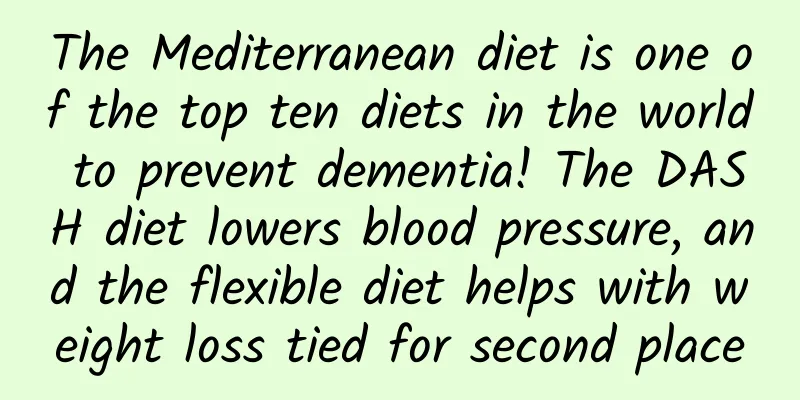The Mediterranean diet is one of the top ten diets in the world to prevent dementia! The DASH diet lowers blood pressure, and the flexible diet helps with weight loss tied for second place

|
Mediterranean diet voted best diet yet again! In addition to reducing the risk of dementia, the Mediterranean diet is also suitable for diabetic patients because it contains mostly low-GI foods that can prevent a sharp rise in blood sugar levels. In addition, because it uses olive oil, which is rich in unsaturated fatty acids, as the main oil source, it has an anti-inflammatory effect on the body; because the Mediterranean diet has many health benefits, it was once again ranked No. 1 in the world's best diet for 2021 by American food and weight loss experts, followed closely by the DASH diet and the flexible diet, which tied for No. 2. According to CNN, US News & World Report invited 24 health experts who are passionate about diet, weight loss and obesity, including experts in nutrition, diabetes, heart, human behavior and weight loss, to conduct the latest survey on dietary evaluation and publish the results. The Mediterranean diet once again took the gold medal and ranked No. 1 in the world's best diet in 2021! 1. Mediterranean diet What is so special about the Mediterranean diet that has allowed it to maintain its position for so many years? The Mediterranean diet is characterized by simple plant-based cooking. In addition to containing a large amount of low-GI foods in each meal, such as vegetables and fruits, whole grains, beans, and nuts and seeds, which can prevent a sharp rise in blood sugar, it also places special emphasis on adding good oil sources, such as extra virgin olive oil, which is rich in Omega-3 unsaturated fatty acids with anti-inflammatory effects. In addition, the Mediterranean diet also emphasizes reducing the consumption of refined sugars and flour, usually with fish as the staple food, and reducing the intake of red meat. Many studies in the past have found that the Mediterranean diet contains a lot of fruits and vegetables and a moderate amount of red wine. The polyphenols in the diet have antioxidant properties, which can not only help reduce the risk of dementia; but also because olive oil is the main source of oil, it helps lower bad cholesterol in the blood and reduce the incidence of cancers such as breast cancer. No. 2: DASH diet, The Flexitarian Diet (tied) Following the Mediterranean diet are the DASH diet and the Flexitarian Diet. The full name of the DASH diet is Dietary Approaches to Stop Hypertension, which originally means a dietary approach to lowering high blood pressure. Proposed by the National Institute of Health (NIH), it is characterized by high-fiber, low-fat foods and was originally provided to hypertensive patients as an option for lowering blood pressure in addition to medication. In addition, its high fiber and low fat properties can also help with weight loss. The DASH diet recommends foods rich in fiber, protein, calcium, potassium, and magnesium, including vegetables, fruits, low-fat, low-fat dairy, whole grains (and reducing the intake of refined grains), vegetable oils, lean meats, fish, chicken, nuts, and beans. Avoid foods high in saturated fats (such as fatty meat, whole milk, coconut oil, palm oil), trans fats, and high in sodium (not more than 2,300 mg per day). In addition to being ranked the #1 best diet for heart health because it helps lower high blood pressure, the DASH diet was also ranked the best eating pattern for weight loss. Studies have shown that the DASH diet can effectively lower blood pressure. In addition, it can also reduce the level of bad low-density cholesterol (LDL) and triglycerides in the blood and increase the level of good high-density cholesterol (HDL). In the past, there was a study by Lawrence, MD, from the Department of General Internal Medicine, Johns Hopkins University School of Medicine, Baltimore, USA. J. A study conducted by Lawrence J Appel and his research team and published in JAMA Network, a supplement of the Journal of the American Medical Association, pointed out that two variations of the DASH diet, replacing 10% of daily carbohydrates with protein or unsaturated fat, can further lower blood pressure, lower LDL and triglycerides and reduce the risk of cardiovascular disease. As for the Flexitarian Diet, the noun consists of "vegetarian" and "flexible". This term was coined by nutritionist Dawn more than ten years ago. Jackson. Created by Dawn Jackson Blatner, it advocates following a vegetarian diet most of the time; however, when the appetite urges, you can also chow down on a burger or steak. The flexible vegetarian diet uses vegetables as the main food and reduces meat intake. Not only does it not require a complete abstention from meat to achieve health, but it can also reap the benefits of being a vegetarian and is easier to follow than the ketogenic diet. Following this eating pattern can not only help you lose weight, but also improve your overall health, including reducing the risk of cardiovascular disease, diabetes, and cancer, and may even help you live longer. In addition, according to the results of this selection, the flexible diet and the Mediterranean diet were also ranked first as the best diabetes diet. No. 4: Weight Watchers Diet This diet was invented in 1963 by a housewife named Jean Nidetch who successfully lost weight. This diet uses a system called PointsPlus to replace calorie calculations. It assigns a certain number of points to individuals based on their current weight and target weight. The total score of each person's eating must be kept within the specified score range in order to effectively lose weight. Each food and drink has its own score. The system assigns points to the food based on the protein, carbohydrates, fat and fiber content. The higher the saturated fat and sugar content, the higher the score; the higher the protein content, the lower the score. The lower the total score, the better. It is important to note that since this system does not take sodium content into account, some people may be at risk for excessive sodium intake, and those with high blood pressure should keep their sodium intake below 2,300 mg per day. In addition, according to the results of this selection, the Weight Watcher Diet and the above-mentioned Flexitarian Diet tied for first place as the best weight loss diet. No. 5: Mayo Clinic Diet, MIND Diet, TLC (Therapeutic Lifestyle Change Diet), Volumerics Diet (tie) The Mayo Clinic Diet was proposed in 2013 by a team of weight loss experts at the Mayo Clinic based on research and clinical experience. It aims to reshape unhealthy old habits through healthy new habits and help obese patients reshape a healthy lifestyle. Emphasize that the best way to maintain a good weight is to make lifestyle changes and develop new eating habits. The base of the Mayo Clinic's healthy weight loss pyramid is based on a large amount of low-calorie healthy foods, such as vegetables and fruits. In 2013, the Mayo Clinic designed it for people with prediabetes and type 2 diabetes, and suggested that this diet could be used to lower or stabilize blood sugar. As for the Mediterranean-DASH diet intervention for neurodegenerative Delay (MIND), it is a dietary pattern that combines the Mediterranean diet and the DASH diet. It emphasizes natural plant-based foods, especially berries and green vegetables, and limits animal food sources such as red meat and high-saturated fat intake. The Meddiet diet mainly includes 10 brain-protecting foods (green leafy vegetables, other vegetables, nuts, berries, beans, whole grains, fish, poultry, olive oil, and red wine), and avoids 5 unhealthy foods (red meat, butter and margarine, cheese, pastries and desserts, and fried and fast foods). This diet is thought to improve cognitive function and slow the progression of Alzheimer's disease. The TLC diet, also tied for fifth place, is the full name of the Therapeutic Lifestyle Change, which was proposed by the U.S. Department of Health and Human Services (HHS) in 2004. The main dietary points are as follows: (daily) fat intake should not exceed 25-30% of total calories, saturated fatty acids should not exceed 7% of total calories, cholesterol should not exceed 200 mg, sodium intake should not exceed 2400 (about 6 grams of refined salt), dietary fiber intake should be 20-30 grams, daily intake of water-soluble fiber should be 10-25 grams, and daily intake of 2 grams of plant sterols (such as nuts, sesame seeds, almonds or seaweed). Dietary guidelines are mainly set for patients with hyperlipidemia and heart disease. Through a low-fat diet and the distribution of fatty acid intake, blood lipids can be lowered and the risk of cardiovascular disease can be reduced, thereby reducing patients' dependence on drugs. Tied for fifth place is the Volumetrics Diet, which was published in the journal Obesity Research in 2005 by Dr. Barbara Rolls, a professor of nutritional science and obesity researcher at Pennsylvania State University. Its feature is that it does not require calorie counting, and emphasizes that people can achieve a sense of fullness and lose weight by eating large amounts of low-calorie foods, including clear soups, salads and other foods. Mainly by prioritizing foods that are high in water content and low in calorie density to increase satiety. Additionally, this diet encourages other healthy habits, such as regular exercise and keeping a food diary, to help improve weight loss results. 9. Nordic Diet, Ornish Diet (tie) The Nordic Diet originated from the Nordic countries. It emphasizes high-fiber foods and pays attention to locality and seasonality. Therefore, the food is mainly composed of a large amount of root vegetables, berries, whole grains, deep-sea fish, nuts, and low-fat dairy products. The World Health Organization (WHO) announced that the Nordic Diet can reduce the incidence of cardiovascular disease, diabetes, and cancer just like the Mediterranean Diet. The Ornish Diet, which is ranked 9th among the best diets of the year along with the Nordic Diet, was invented in 1977 by Dean, a clinical professor of medicine at the University of California, San Francisco. Founded by Dr. Dean Ornish. This diet is almost entirely vegetarian, low in fat, refined carbohydrates, and animal protein, and mainly consists of fruits, vegetables, whole grains, beans, legumes, fat-free dairy products, and protein. It advocates that dietary fat should not exceed 10% of total daily calories, making it an extremely low-fat diet. What’s special is that the Ornish diet not only focuses on diet, but also emphasizes exercise, stress management and interpersonal relationships. In terms of exercise, emphasis is placed on aerobic training, resistance training and flexibility training; in terms of stress management, emphasis is placed on relieving stress through deep breathing, meditation or yoga. Finally, Dr. Ornish also said that spending more time with people you love and respect and gaining their support can have a better impact on your health. |
Recommend
What medicine is best for uterine fibroids?
Uterine fibroids are a common gynecological disea...
Diabetic patients who do not want to rely on insulin use weight loss surgery
Currently, there are about 1.66 million people su...
What causes menstrual blood clots?
Menstrual blood clots are a normal physiological ...
Does adenomyosis cause back pain?
Does adenomyosis cause back pain? The symptoms of...
Worried about cholesterol when eating eggs? How many eggs can you eat every day? Nutritionist: What is more important than quantity is "this"
Eggs are an indispensable part of modern people&#...
Ovarian cysts may cause dysmenorrhea
Ovarian cysts may cause dysmenorrhea , but people...
What to eat after abortion of cervical erosion
Cervical erosion harms the patient's health. ...
5 minutes a day to easily get a six-pack (Part 1)
How strange! Many people have slender and well-pr...
My period came on November 5th but didn't come on December 5th
If your period that started on November 5th has n...
How to prevent the infection of cervical warts
Cervical warts are a type of disease that is main...
10 Amazing Benefits of Bananas
Bananas are popular all over the world for their ...
What are the symptoms of uterine fibroids?
Uterine fibroids are a common disease in women an...
Surgical treatment of Bartholinitis
Bartholinitis is a common disease among women. In...
Drinking chocolate milk after exercise can help you build muscle and lose fat? Nutritionist answers…
Friends who have the habit of exercising must hav...
What medicine should I take for ovulation bleeding?
What medicine should I take for ovulation bleedin...









